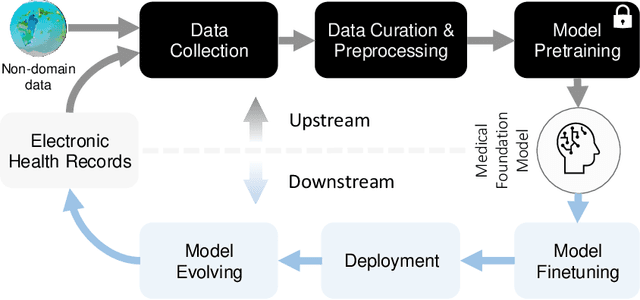Veridical Data Science for Medical Foundation Models
Paper and Code
Sep 15, 2024
The advent of foundation models (FMs) such as large language models (LLMs) has led to a cultural shift in data science, both in medicine and beyond. This shift involves moving away from specialized predictive models trained for specific, well-defined domain questions to generalist FMs pre-trained on vast amounts of unstructured data, which can then be adapted to various clinical tasks and questions. As a result, the standard data science workflow in medicine has been fundamentally altered; the foundation model lifecycle (FMLC) now includes distinct upstream and downstream processes, in which computational resources, model and data access, and decision-making power are distributed among multiple stakeholders. At their core, FMs are fundamentally statistical models, and this new workflow challenges the principles of Veridical Data Science (VDS), hindering the rigorous statistical analysis expected in transparent and scientifically reproducible data science practices. We critically examine the medical FMLC in light of the core principles of VDS: predictability, computability, and stability (PCS), and explain how it deviates from the standard data science workflow. Finally, we propose recommendations for a reimagined medical FMLC that expands and refines the PCS principles for VDS including considering the computational and accessibility constraints inherent to FMs.
 Add to Chrome
Add to Chrome Add to Firefox
Add to Firefox Add to Edge
Add to Edge